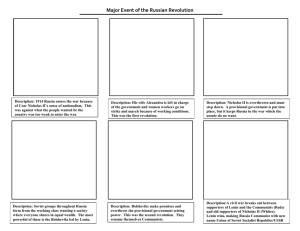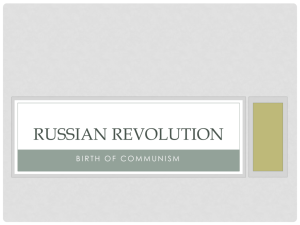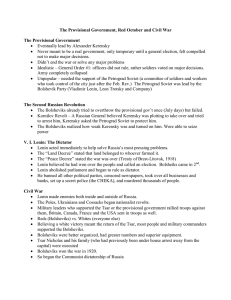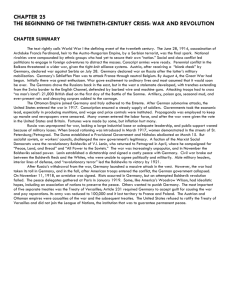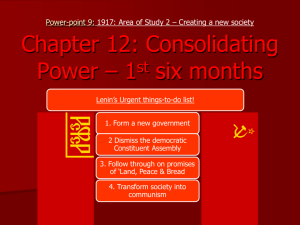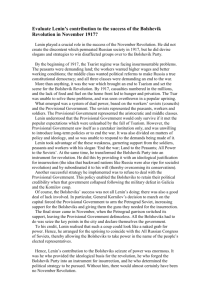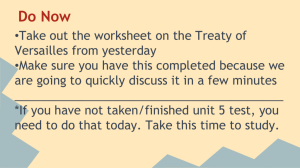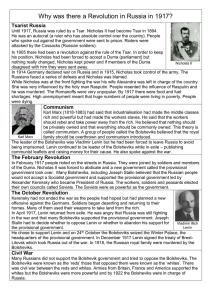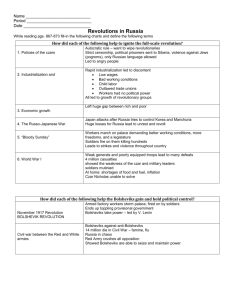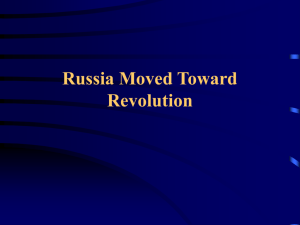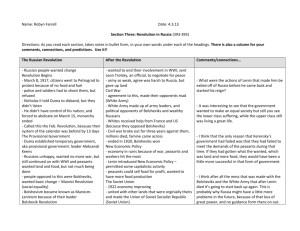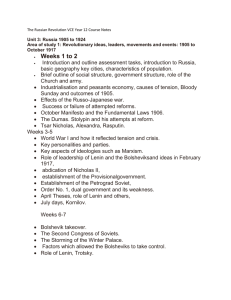Unit 4: Revolutions
advertisement
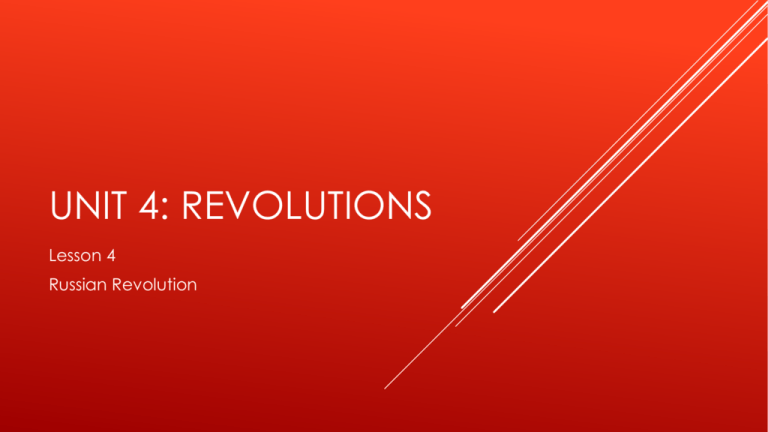
UNIT 4: REVOLUTIONS Lesson 4 Russian Revolution The variety of opinions demonstrated by Enlightenment philosophy about the most effective structure for government and society. The impact that literature and art had in revolutionizing society in Western countries. The shift from government power being absolute and from God to it being derived from the common man and the varying perspectives on this during the Enlightenment. WHAT I NEED TO KNOW People around the world are rebelling against their governments as a result of societal and economic inequalities Government exploitation by European powers through taxation and economic inequalities inspired revolution. Growing class divisions led to conflict as people rebelled against their government. OBJECTIVES Should all citizens have equal rights regardless of economic or educational background? How does scarcity of resources affect relationships between various groups of people? How Is do economic disparities result in political unrest and revolution? political change inevitable? GUIDING QUESTIONS By 1917- Two revolutions swept through the nation Chronic civil unrest plus food shortages Within the reign of Nicholas II there has been government corruption and a backward economy Constant People disbanding of the Duma (parliament) had lost faith WHAT LED TO IT: WE ARE FOCUSING ON 1907 Frustration Corruptions Economy REASONS FOR REVOLT began on March 8, 1917 when demonstrators shouting for bread took Russian capital of Petrograd. Supported by huge crowds of industrial workers, the protesters clashed with police. Irate mobs destroyed police stations. Army was called in and some regiments opened fire, killing demonstrators, but the people would not leave and the troops began to back off. March 11 King dissolves the Duma again and the soviet troops begin to join forces with the protesters. The imperial government resigns and the Duma reforms a provisional government. Nicholas II leaves the thrown for his brother Michael who refuses it and ends the czarist autocracy. TIMELINE OF EVENTS In November 1917, the government is now shared between the provisional government and the Petrograd Soviet. A Bolshevik radical leader (Vladimir Lenin) starts a coup’ against the provisional government. The Bolsheviks occupy the government leaders and form their own new government. Lenin becomes the dictator of the first Marxist state. They make peace with other nations and distributed land. In 1918 a civil war begins against the Bolsheviks begin. In 1920 these people are defeated and in 1922 a union of soviet socialist republics (USSR) is formed. TIMELINE OF EVENTS Collapse of the Russian Empire and the Czars. Chronic civil unrest plus food shortages led to revolts forcing Nicholas II (czar) to leave the throne. Bolsheviks, led by Vladimir Lenin (1870-1924) After Czar Nicholas II and his family were executed by Bolshevik forces in July 1918. They hid the victims’ mutilated bodies. The remains were discovered in the late 1970s. Civil War enacted between the Whites and Red (socialism and the provisional government (communist) which allowed Lenin to rise) Rise of socialism in Russia OUTCOME OF THE WAR IMPORTANT PEOPLE/ IDEAS Nicholas II: Tsar and leader of the communist government of Russia. Was overthrown by the Bolsheviks and assassinated with their mutilated bodies hidden (Disney Anastasia). End of aristocracy in Russia Bolsheviks: Extreme political group that joined together with the working class (those working in the factories) and overthrew the government. Led by Lenin Socialism: social and economic system characterized by social ownership and/or social control of the means of production and co-operative management of the economy, as well as a political theory and movement that aims at the establishment of such a system Communism: a social, political, and economic ideology and movement whose ultimate goal is the establishment of the communist society, which is a socioeconomic order structured upon the common ownership of the means of production and the collapse of social orders Karl Marx: Philosopher who created the ideals that fueled socialism Lenin: Bolshevik leader who helped overthrow in the temporary leader and became a socialist dictator. Distributed land to the peasants and abolished the aristocracy of Russia. https://www.youtube.com/watch?v=bKhuvril8Rs 17:34-31:13…. 133-210. OLYMPIC REPRESENTATION OF THEIR HISTORY Should all citizens have equal rights regardless of economic or educational background? How does scarcity of resources affect relationships between various groups of people? How do economic disparities result in political unrest and revolution? Is political change inevitable? REVIEW: GUIDING QUESTIONS
